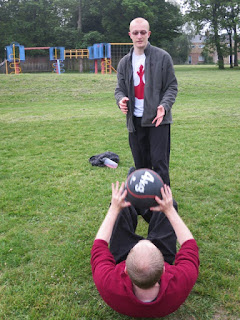Thursday
Confirmation bias...
Imagine that you have a belief such as - 'people are generally good'. This belief causes you to notice information that confirms your belief and discount information that disputes it. See the problem?
A belief introduces a bias, a perspective, and it alters how you look at the world. You essentially see what you want to see. Having opinions, ideas and preconceptions can make you narrow-minded.
Once we determine what is important, we set out to find something that fits our criteria. But what if our values are askew? What happens when we encounter things that we don't really understand?
Wednesday
As a teacher I am continually impressed with Sifu Waller's teaching system, resources
and the time he takes with classes. I often feel like emailing him to thank
him for another outstanding lesson but a) this could happen most weeks and
b) I do actually feel guilty for not being a good enough student.
(Tim)
(Tim)
5 mins = £100
Imagine if you were told that 5 minutes tai chi training would earn you £100...
Would you do the exercises? Of course you would.
Yet, people are told that daily home practice = good health, fitness and better quality of life... and they dismiss it. Curious?
This illustration shows how many people value an obvious monetary reward but are unwilling to appreciate the value of health, vitality and fitness.
Yet, people are told that daily home practice = good health, fitness and better quality of life... and they dismiss it. Curious?
This illustration shows how many people value an obvious monetary reward but are unwilling to appreciate the value of health, vitality and fitness.
T-shirts
The assistant teachers who help me to teach tai chi for health have asked about wearing a different T-shirt in order to better distinguish who to ask for help in class.
The grey colour is very nice and I like the message too!
Rachel
The grey colour is very nice and I like the message too!
Rachel
Monday
Talk is easy...
Many people e-mail every week regarding tai chi classes, fitness and diet. Other people talk to me in person.
How many people actually commit to classes, getting fit or losing weight? Not many at all.
For some people, talking about things seems to be enough. They expend a lot of energy explaining why they can't make commitments or lifestyle changes.
How many people actually commit to classes, getting fit or losing weight? Not many at all.
For some people, talking about things seems to be enough. They expend a lot of energy explaining why they can't make commitments or lifestyle changes.
Responsibility...
An amusing insight regarding 'corrections' is this: in real terms your teacher doesn't actually correct you...
They merely point out what you are doing incorrectly and provide an accurate example. It is the student themselves who does the correcting.
After all, the teacher cannot make you practice at home between classes, can they?
Once the teacher has highlighted a mistake, it is the student's own responsibility to implement and practice the correction.
Creativity
Every year my charity has a Strategy Day. A professional Facilitator
is usually hired for the event. Up to a dozen people put their heads
together all day long and never produce very much.
By contrast, by the time I get downstairs in a morning, Sifu has already written a 'to do list' of new insights for me to consider. These cover a diverse range of topics (including but not limited to):
- class management
- teaching
- qigong, taijiquan, baguazhang, core strength, combat insights
- the syllabus
- meditation
- time management
- diet
- targetting muscle groups I feel are underworked
How often does this happen? DAILY.
By contrast, by the time I get downstairs in a morning, Sifu has already written a 'to do list' of new insights for me to consider. These cover a diverse range of topics (including but not limited to):
- class management
- teaching
- qigong, taijiquan, baguazhang, core strength, combat insights
- the syllabus
- meditation
- time management
- diet
- targetting muscle groups I feel are underworked
How often does this happen? DAILY.
Thursday
A tai chi class
Most tai chi classes in the UK are essentially drop-in sessions. Students attend as and when they feel like it. The teacher is often not qualified and there is no syllabus in place.
The attenders usually have a good time. They follow along with the group and do more or less the same things every week. Very little progress takes place but people enjoy being there.
The attenders usually have a good time. They follow along with the group and do more or less the same things every week. Very little progress takes place but people enjoy being there.
Wednesday
A tai chi school
• Professional instruction from a qualified instructor
• Fully-differentiated syllabus • 13 areas of study
• Address individual health concerns & training requirements, tips & pointers, refinement & corrections, one-to-one assessment/feedback/guidance
• New material every week• Access to on-line resources and school DVDs, workshops, boot camp and class social events
• Complete biomechanical understanding of form, along with exploration and application of The Tai Chi Classics
• Opportunity to study multiple taijiquan forms, chin na (seizing), shuai jiao (take downs), self defence, form applications, weapons training, neigong (whole-body strength), jing (whole-body power), Taoism& Zen, martial theory & practical application, taijiquan principles, meditation, brain work (meditation, awareness, metacognition)
This level of study is not going to happen via a drop-in class...
• Fully-differentiated syllabus • 13 areas of study
• Address individual health concerns & training requirements, tips & pointers, refinement & corrections, one-to-one assessment/feedback/guidance
• New material every week• Access to on-line resources and school DVDs, workshops, boot camp and class social events
• Complete biomechanical understanding of form, along with exploration and application of The Tai Chi Classics
• Opportunity to study multiple taijiquan forms, chin na (seizing), shuai jiao (take downs), self defence, form applications, weapons training, neigong (whole-body strength), jing (whole-body power), Taoism& Zen, martial theory & practical application, taijiquan principles, meditation, brain work (meditation, awareness, metacognition)
This level of study is not going to happen via a drop-in class...
Tai chi class or tai chi school?
Most people never think to ask whether or not they want to attend a tai chi class or a tai chi school. The two are not the same.
It is worth considering the differences...
It is worth considering the differences...
Balancing the whole body...
I realised why Sifu won't offer guidance on medical conditions:
1) We're not doctors or physiotherapists
2) We're already teaching exercises that could potentially fix up many conditions
3) We cannot make a student do the work at home
You can lead a horse to water but you can't make it drink?
Rachel
Rachel
Monday
Posterior pelvic tilt
At boot camp I noticed that some students still have a 'posterior pelvic tilt' (the bottom of the pelvis tilts forward when sitting on the floor).
This is a medical problem and as such we don't offer a fix. However, out of curiosity I researched the condition...
Many of the recommended exercises for fixing posterior pelvic tilt look similar to the ones in the syllabus. In fact, we work significantly more muscles than the recommended 'fix'.
But the exercises have to be practiced with regularity... and the individual needs to sit a lot less.
This is a medical problem and as such we don't offer a fix. However, out of curiosity I researched the condition...
Many of the recommended exercises for fixing posterior pelvic tilt look similar to the ones in the syllabus. In fact, we work significantly more muscles than the recommended 'fix'.
But the exercises have to be practiced with regularity... and the individual needs to sit a lot less.
Subscribe to:
Posts (Atom)


















































